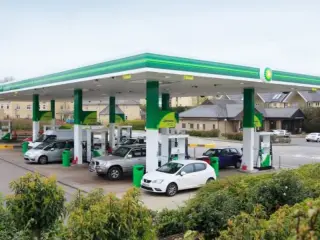
Oil prices are notoriously volatile, particularly over the last few years as the price of fuel reached an all-time high. This is driven by a complex mix of factors that influence supply and demand on a global scale.
From geopolitical tensions and natural disasters to shifts in economic policy, a wide range of forces can push oil prices up or down in ways that are often unpredictable.
This article explores the primary factors behind these fluctuations, including OPEC’s production decisions, economic growth rates and technological developments. By understanding these dynamics, you can gain a clearer picture of why oil prices change and what these shifts mean for you at the pump.
What causes oil price fluctuations?
Oil price fluctuations are primarily driven by the balance of supply and demand, influenced by a range of economic, political, and environmental factors.
On the supply side, production levels set by major oil-producing countries, particularly OPEC (Organisation of the Petroleum Exporting Countries), play a significant role. When production increases, prices generally fall, and when it decreases, prices often rise.
Geopolitical tensions in key oil-producing regions, like the current conflict in the Middle East, can disrupt supply and lead to sudden price spikes.
In terms of demand, global economic growth is a major factor. In periods of rapid economic expansion, demand for oil rises, pushing prices higher, whilst economic slowdowns reduce demand and lead to lower prices. This was seen during the Covid-19 pandemic when the price of fuel plummeted in the UK.
Other factors include currency fluctuations, especially the strength of the US dollar (in which oil is typically traded), and market speculation, as investors react to forecasts and trends. This contributes to price shifts, impacting fuel costs in the UK.
Are oil prices rising right now?
In 2024, oil prices have somewhat stabilised, hopefully marking an end to the extreme volatility we’ve experienced over the last few years. However, global events have affected the oil market and there’s still uncertainty about the impact they could have on the price of oil.
The price of Brent crude oil is currently around $75 a barrel* which is slightly higher than in September. This is due to several reasons:
Delays to increase oil output
Last week, OPEC+ announced they would postpone plans to gradually increase oil output until the end of December 2024. Although this should help to settle the markets, Brent crude oil prices immediately rose by 2.7%.
Conflict in the Middle East
The ongoing conflict in the Middle East, particularly the Israel-Gaza crisis, has elevated fears of broader regional instability that could disrupt oil supply routes. Although oil production has largely remained unaffected so far, there are concerns about the potential for further escalation that might impact major oil-producing countries.
US election
Donald Trump winning the US election had a ripple effect on the oil market with oil prices initially falling. Investors will closely monitor the impact of his re-election and the potential fallout on the oil supply. It’s likely that at least in the short-term, prices may fluctuate as a result.
How rising oil prices impact UK businesses and fuel card users
Petrol price movements are determined by the price of crude oil and the exchange rate between the dollar and the pound. So, if oil prices rise then UK pump prices will too. This will have a significant impact on UK businesses, as higher fuel prices will lead to increased operational costs.
Companies that depend on vehicle fleets, such as logistics and delivery businesses, face difficult choices. They can either absorb these costs which affect profitability, or pass them onto customers, potentially impacting competitiveness and demand.
Rising oil prices can also add to the pressure on small businesses, as they often operate on tighter margins and have limited pricing power.
Fuel cards can be a cost-effective solution, as you pay a fixed-weekly price which is often cheaper than the pump, especially on motorways. This can help businesses mitigate the impact of rising fuel prices and improve the efficiency of their fleet.
However, fuel card prices are more closely aligned with the wholesale cost of fuel than what is advertised at the pump. This means costs can sometimes increase sooner as the impact of the oil market on the pumps can be delayed.
Practical tips for managing fuel costs amid rising oil prices
To manage fuel costs during periods of volatility, you can take several practical steps to improve efficiency and reduce expenses. These include:
Adopt telematics – using telematics systems can help you monitor fuel usage, optimise routes, and reduce idle time, all key contributors to fuel savings.
Use fuel cards – our fixed-price fuel cards offer competitive fuel prices and consolidated billing, helping you manage cash flow more effectively and track the fuel expenses of your fleet.
Educate your drivers – training your drivers on fuel-efficient driving practices, such as gentle acceleration and braking, which can lower fuel use. Explore our hypermiling tips to discover how to prevent unnecessary fuel consumption.
Consider alternative fuels – switching to a greener vehicle can provide long-term cost savings, especially as the infrastructure for electric vehicles expands. This is just one reason why businesses should switch to electric.
Stay informed on market trends - monitor UK oil prices and adjust budgets accordingly to proactively manage fuel costs.
Oil price fluctuations are influenced by a complex web of global factors. Understanding these dynamics is essential for businesses, as it allows for more informed financial planning and adaptation to volatile markets.
Implementing cost-saving technologies and fuel-efficient practices can help mitigate some immediate impacts. However, long-term strategies focusing on sustainability may ultimately provide greater resilience against future oil price volatility.
Right Fuel Card can help you manage fuel costs more effectively, especially amid rising prices. Compare our range of fuel cards or contact our team to discuss your options further.
*Prices accurate as of 08th November 2024




